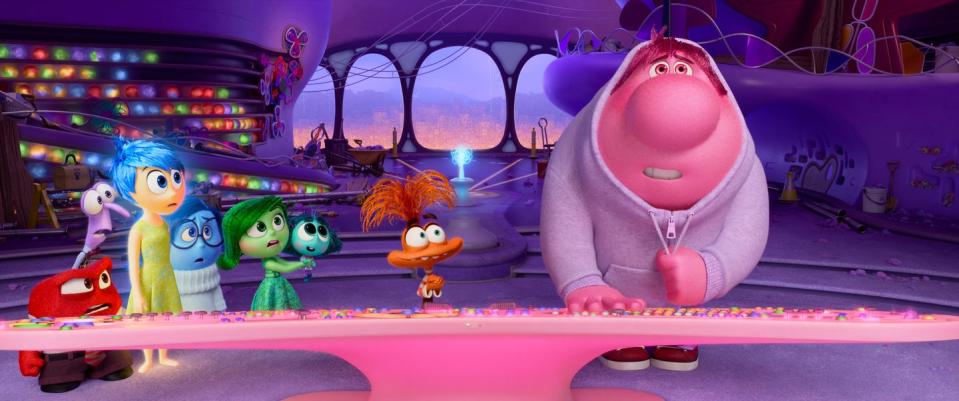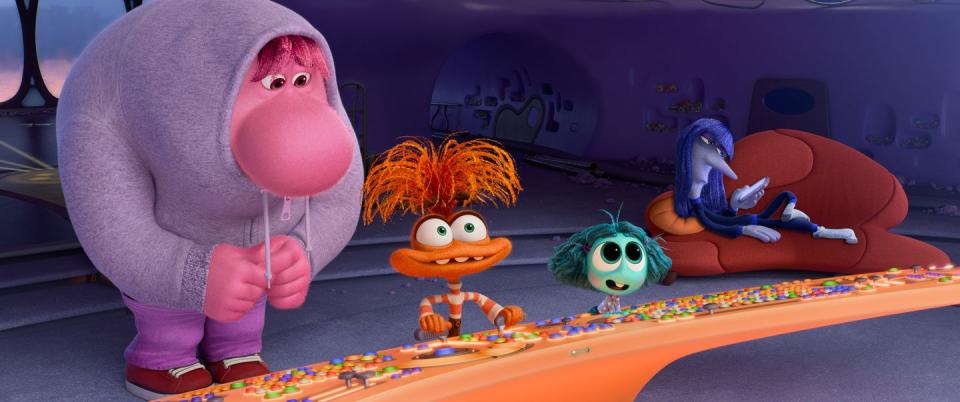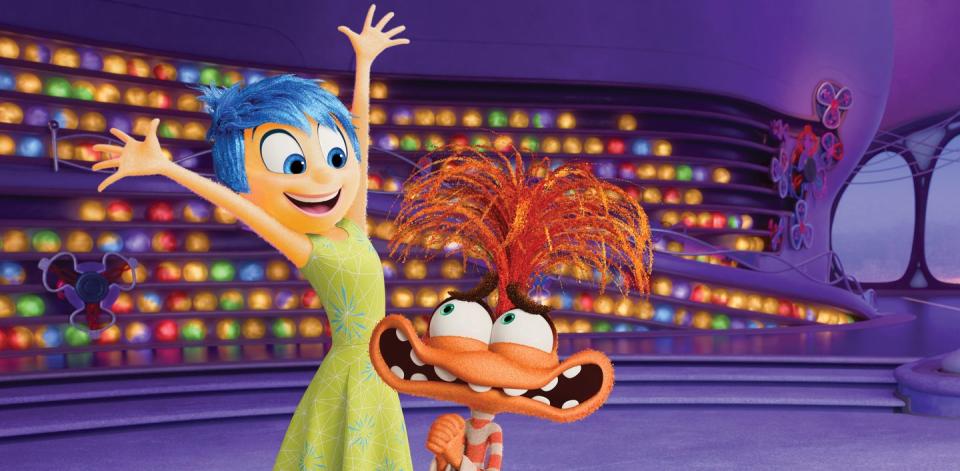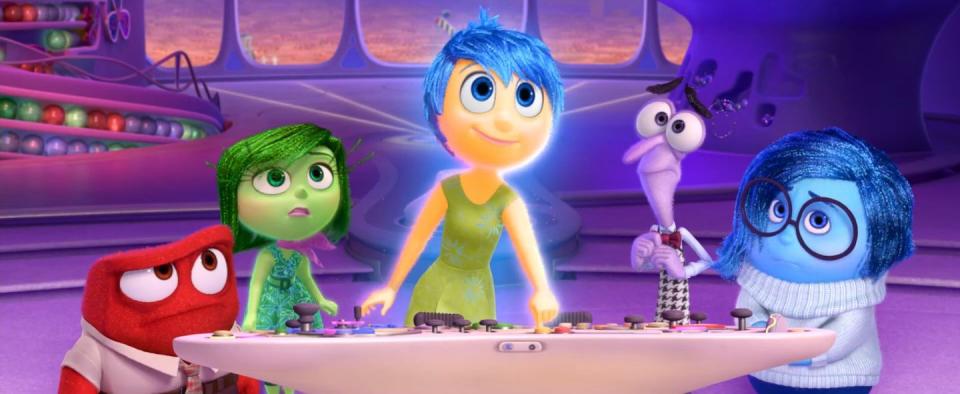Inside Out 2's treatment of anxiety made me feel seen
Inside Out 2 ending spoilers follow.
I was a bit anxious going into the sequel for Inside Out.
Yes, a lot of that had to do with the first Inside Out and how it's easily one of Pixar's best. How can you mess with perfection?
The same could have been said for Toy Story and The Incredibles though, and the world is obviously better off with sequels to those films. Thankfully, Inside Out 2 is another one of those sequels which more than justifies its existence, expanding the world of the first film in ways that still feel true to this gorgeous, meaningful concept that Pixar created back in 2015.
But after the credits for Inside Out 2 rolled and the lights turned on, I still felt anxious.

For 96 glorious minutes, I had forgotten the world outside the cinema. All my attention and innermost thoughts had been directed on the innermost thoughts of Riley instead. But with the rush of wind that hit me walking outside also came a rush of worries, the kind that have almost become background noise to me at this point.
Will all that popcorn I ate give me a bad stomach? Do I really have time to hit that deadline tomorrow? Will my friend be annoyed that I still haven't replied to her voice note yet?
These aren't big worries, don't get me wrong. I have those too, huge all-encompassing anxieties that wake me up at night and keep me awake until the following morning. But these smaller, fleeting anxieties? I'm so used to them at this point that I don't even notice that's where my mind has gone half the time. But that's not to say they can't be damaging.
Inside Out 2 introduces Anxiety as a new emotion alongside Embarrassment, Envy and Ennui, all of whom arrive as puberty crashes into Riley's world like a literal wrecking ball.
Anxiety looks and sounds exactly as you'd expect thanks to the minds at Pixar and Maya Hawke's voice alike. She's frazzled because Anxiety is always on edge, about to snap at any moment, and that's what anxiety feels like in an emotional sense for sure. Always teetering at the point of breaking, overwhelmed by all the potential problems that could come my way.
That's the key word right there: "Could." Because anxiety isn't rational, just like the world isn't rational, but anxious people like me try and rationalise the world around them regardless, coming up with every bad scenario that could possibly happen in a bid to avoid them entirely.
The irony is that by trying to prevent yourself from feeling bad, anxiety ends up doing precisely that anyway. If anything, it often makes you feel worse than the imagined, extremely unlikely scenario ever could.
That's exactly what happens in Inside Out 2. What at first seems like Riley's straight-forward responses to some of the new challenges puberty brings soon becomes all-consuming in her mind. There's no room for joy or even sadness, and that's true in a very literal sense when Anxiety goes a step too far and locks all our faves out of Riley's core.
When I'm stuck in an anxious loop, replaying worst case scenarios over and over in my mind, it feels like my imagination has turned against me. Inside Out 2 nails this as well when we see Hawke's Anxiety encourage the creative corners of Riley's mind to come up with as many bad outcomes as possible, no matter how ludicrous they might sound.

That leads to some funny moments – how could Riley seriously think her tongue was going to get stuck to the ice rink floor? – but when you're caught in that loop, you're not always thinking rationally about the likelihood of said outcomes.
Inside Out 2's version of anxiety is more focused on immediate concerns than long-reaching worries, but as the film makes clear, that can be just as damaging, to the point where your sense of self becomes defined by this endless, exhausting negativity. Exhausting because it's the kind of worrying that you can physically lose sleep over, but also just tiring in a day-t0-day sense as well.
What's perhaps most strange about anxiety is when you're anxious without even realising it. You're so used to being on flight mode all the time, having that constant adrenaline rush for no reason, that you suddenly notice your chest feels tight or your stomach feels tense. Sometimes I have to remind myself to stop for a second and just breathe, to let go for a moment and get some perspective.
But that's not always easy on your own, a lesson Anxiety and Riley alike are forced to face in Inside Out 2.

By the end of the sequel, everything has just become too much for Hawke's character. In her bid to control every possible outcome and fix everything that could go wrong, Anxiety becomes too exhausted and strung out to do anything other than focus on the bad with no way out. This all culminates in a whirlwind that manifests as a full-blown panic attack on the outside.
There's panic inside too, but then Joy steps up, and with the help of the other emotions, they manage to pull Anxiety out of her dangerous cycle. This speaks of course to the need for community, how friends and family can help when these downward spirals take over completely. I sure know that voicing my worries out loud to my friends can be a huge help, more often than not.
But what really struck me about this scene in particular is how Joy is the one to aid Anxiety first, and not just because Amy Poehler's the biggest name on the call sheet either.
When all you do is look ahead to the future, it's so hard to live in the present. Your world becomes a myriad of painful outcomes and there's no space left in your brain to enjoy what's happening in the here and now.

So it's no coincidence that Joy in particular feels useless when Anxiety takes control. There's physically no space left for her in Riley's mind, something I've experienced a lot over the years in my adult life. But when all the emotions band together and rescue Anxiety, they succeed in creating a new belief system for Riley that restores balance and incorporates every emotion together as an integral part of her core self.
And as a result, for the first time since puberty kicked in at the start of the movie, Riley truly knows joy again.
What's notable here is that Joy doesn't just kick Anxiety out after everything that's happened. Hawke's character remains an integral part of Riley and an important part of the happy ending too.
Because there's no escaping anxiety, not completely. But by being kinder to ourselves and accepting that anxiety exists, that it can even help us navigate the world to some degree, it's possible to be more mindful and mitigate some of the harm it causes by focusing on joy in the here and now.
That's a huge contrast to the first movie, an inversion of the message Bing Bong's death brought us all. Because while Inside Out encouraged us to look inward and reckon with the past, acknowledging that it's ok to sit with your sadness sometimes, Inside Out 2 asks us to stop looking so much to the future and to live more in the present.
Will that approach stop my own worries from overriding my brain sometimes? Will it help when I'm down on myself and let anxiety dictate my self-worth? No, not quite, but there is something to be said for seeing the inner workings of your own brain depicted with such uncanny accuracy on screen for the first time.
Watching all this play out has helped give me the kind of perspective that's so often lacking when you're wrapped up in your own whirlwind-like force of anxiety.
It's an important reminder to try and bring some joy in when I'm deep in the throes of worry, and I'm sure that it will do the same for others watching too, just like I hope reading this article will, whether you're Riley's age or already feeling the pull of Nostalgia like me at a later stage in life.
Inside Out 2 is out now in cinemas.
You Might Also Like

 Yahoo Movies
Yahoo Movies 
